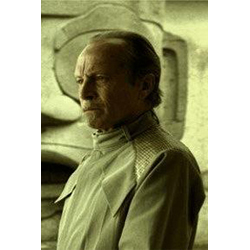Posts in this series:
Raindance 2011- Another Earth to open Raindance
- 18 World Premieres at Raindance
- Festival Preview: 10 Unmissable Raindance Films
- Another Earth
- Interview – Raindance Founder, Elliot Grove
- Skinning (Šišanje)
- Black Pond
- Fambul Tok
- Interview – Fambul Tok Producer, Libby Hoffman
- Hollow
- Amnesty (Amnistia)
- How To Start A Revolution
- Mesocafe
- By Day and By Night (De Dia y De Noche)
- The Box
- Victims
- Interview – Leaving Baghdad Director, Koutaiba Al-Janabi
- Leaving Baghdad
- Bonsai
- Face to Face
- The Ballad of Des and Mo
- Forget Paris
- No Return (Sin retorno)
- Holy Rollers
- The Wedding Party
- War Games
- Scenes of a Crime
- The Fifth Commandment (El Quinto Mandamiento)
- State of Emergency
- Top Ten: Raindance Films
Released: 2010
Director: Alejandro Molina
Starring: Sandra Echeverría, Manuel Balbi
A strange but enjoyable dystopian drama
The world’s population is getting bigger and bigger every day. Our resources are threatened and in some towns and cities there are simply too many people for the local infrastructure to manage. One of the big political questions of the day is how do we cope with the population increase.
Mexican science fiction film By Day and By Night imagines a time in the not-too-distant future when society’s “Leaders” have decreed that people will be split into daytime and nighttime dwellers. To achieve this, an enzyme has been implanted into everyone which adjusts their DNA and determines what time frame they will occupy and work within. The “Great Metropolis” exists within an hermetically sealed dome and there is fear of “The Exterior” which is not as regimented or as safe as the city.
Doctor Aurora Sagittarius is a day-dweller, desperately looking for news of her infant daughter Luna, who we discover has been assigned to life in the nighttime shift. As Aurora becomes increasingly worried about Luna, she begins to question the wisdom of The Leaders who have created a society where children are taken from their parents and entered into a sinister-sounding, but never fully explained, programme of service.
By Day and By Night is an odd film, but that’s not necessarily a criticism. The dystopian society created is fascinating – not only is the population split into two but their entire lives are controlled by the unseen hierarchy. All of the clothes are similar, the women’s hairstyles are eerily alike and even exercise appears to be carried out in a controlled and rigid fashion. The society is completely utilitarian – everything done is in service of the metropolis and there is no opportunity whatsoever for individuality to be displayed. Emotions, pleasure and personal freedom have all been eradicated, although the implication is that this happened before the enzyme implantation.
 Yet, as in all totalitarian regimes, there is a sense of acceptance – even gratitude – towards the government. There is a lovely moment where Aurora’s work colleague asserts that everyone is born free, a claim immediately followed by an announcement that there are five seconds left until the start of the set rest period. The suspicion and paranoia created by living in such a tightly controlled environment is well portrayed here. Characters are desperate to avoid the appearance of criticising the Leaders or questioning how the society is run.
Yet, as in all totalitarian regimes, there is a sense of acceptance – even gratitude – towards the government. There is a lovely moment where Aurora’s work colleague asserts that everyone is born free, a claim immediately followed by an announcement that there are five seconds left until the start of the set rest period. The suspicion and paranoia created by living in such a tightly controlled environment is well portrayed here. Characters are desperate to avoid the appearance of criticising the Leaders or questioning how the society is run.
Sandra Echeverria is absolutely radiant as Aurora and most of the time her acting is excellent, most of the time – there are a couple of moments that put me in mind of Joey Tribbiani’s soap opera acting classes. Manuel Balbi as Urbano, the night dweller who has a connection with Luna, is also very good. The supporting cast is very small and underused. Somewhat ironic for a film about the effects of overpopulation.
The film’s emotion and atmosphere are beautifully complimented by the magnificent score. It soars, and at times is much more powerful than anything we are experiencing visually.
By Day and By Night is not a science fiction action piece. It’s contemplative and thoughtful – a little too much at times. The camera lingers on scenes for longer than is necessary and there are large swathes of the film, including most of the last third, with no dialogue whatsoever. My mind did wander at these points. Audiences don’t need to be spoon-fed the storyline or given ridiculous exposition dialogue but keeping them in the loop doesn’t go amiss either.

